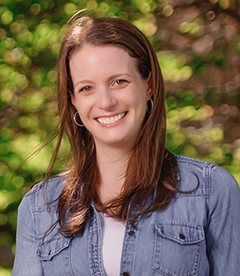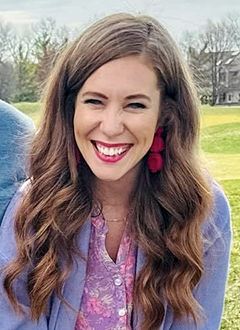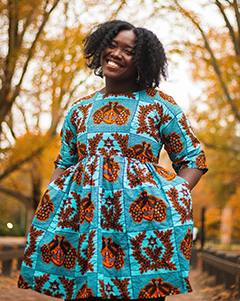 As we enter the final weeks of the submissions period for our 2025 30 Under 30 list, we are taking a look back and reconnecting with some of the inspiring individuals from around the globe who have been recognized on our previous lists. These young visionaries were celebrated for their extraordinary contributions to literacy, and we are thrilled to share their journeys since joining the 30 Under 30 ranks.
As we enter the final weeks of the submissions period for our 2025 30 Under 30 list, we are taking a look back and reconnecting with some of the inspiring individuals from around the globe who have been recognized on our previous lists. These young visionaries were celebrated for their extraordinary contributions to literacy, and we are thrilled to share their journeys since joining the 30 Under 30 ranks.
In this four-part series, we are sharing Q&As with past honorees that offer a look into their personal and professional journey. We are exploring how being named to the ILA 30 Under 30 list impacted their careers, the paths they have taken in the years since, and the valuable lessons they have learned along the way.
Through these conversations, we aim to not only celebrate their successes but also to gather their insights and advice for other emerging literacy leaders. If you know someone who belongs on our 2025 list, then submit a nomination today.
 Jimmie C. Odhiambo (2021)
Jimmie C. Odhiambo (2021)
Recent MSEd Graduate/Education and Innovation Consultant
University of Pennsylvania, U.S.
How did receiving the 30 Under 30 honor from ILA impact you both personally and professionally?
The 30 Under 30 honor shone a light on the literacy developments happening in the south of Kenya where I and the Afribuk Society team were working with several communities. It showed the world that communities can come together to see their children literate. On a personal note, this recognition exposed me to multiple resources and individuals within the ILA community that I have stayed in touch with collaboratively and professionally. In addition, the opportunity to contribute to Literacy Today magazine has provided an avenue to share what works and what literacy practices matter and for whom.
Looking back, how has the recognition from ILA motivated you to continue your efforts in advancing literacy, and what future goals do you have in this regard?
I am considering doing a PhD to look at how rigorous and evidence-based educational technologies (particularly reading and writing technologies) can reach the hands of marginalized learners.
Have there been any unexpected benefits or outcomes as a result of receiving the honor?
As a corollary to the honor, our work as Afribuk Society has received substantial support in the form of tangible (books and educational resources) and monetary donations to further our efforts. We’ve been supported by organizations such as End Book Deserts and KidLit TV and have also received individual support from local and international people.
What projects or initiatives have you been involved in since receiving the 30 Under 30 honor?
- BEFIT, Malawian Government education technology project to provide literacy and numeracy content for grade 1–4 in Malawi, 2023
- Ustawi Survey, an Ustawi Global technology multidimensional poverty tool to identify community assets in six dimensions (education, health etc.) in Kenya, 2021
- IFERB, an Education Above All Foundation project-based, game-based, and play-based learning approach for contextual and holistic hands-on learning for 4- to 15-year-olds, Qatar, 2022
What advice would you give to current educators or literacy advocates who aspire to make a difference in the field?
I believe in starting where you are, identifying the most marginalized within those contexts. And then start small: one learner, three learners, a community, etc. These small and articulated groups will provide you with rich understanding of the literacy diversity that big groups won’t.
How do you see the future of literacy education evolving, and what role do you hope to play in that?
I see, after the hype of AI has passed, the developments in AI could democratize literacy education by supporting multilingual learners around the globe with the opportunity to learn in their own language. What I am working on is ensuring human-centered approaches and partnerships in technology design and validation catalyze this emergence of equitable education technology and innovation.
 Louise Baigelman (2015)
Louise Baigelman (2015)
Founder and CEO, Storyshares
Pennsylvania, U.S.
How did receiving the 30 Under 30 honor from ILA impact you both personally and professionally?
The ILA 30 Under 30 honor was the very first significant award I received in my early days of founding Storyshares. Being selected for this prestigious list among so many esteemed peers from around the globe was a meaningful confidence boost for me, and more important, it served as a catalyst for Storyshares as we made our debut in the literacy space: working to build a community and company dedicated to engaging and empowering students who are learning to read beyond elementary school. After receiving the award from ILA, we went on to be honored by Teach for America’s Social Innovation Award, the Forbes 30 Under 30 List, the Milken Penn Business Competition, and the Library of Congress for our innovative work in literacy. The initial recognition from ILA surely contributed to this additional recognition—and to the growth of Storyshares—which today serves millions of students in all 50 states of the U.S. and 180 countries around the world.
How do you continue to stay inspired and motivated in your work in literacy?
For me, the most motivating force is getting to see the transformation that happens when reluctant readers discover the joy of reading—when they can finally find stories that resonate with their interests and identities and begin to rethink their identities as readers.
While this work brings new challenges to overcome each day, it brings new stories of triumph from teachers and students at an even higher rate. Educators tirelessly seek new content and resources to engage and empower their students who are learning to read beyond elementary school, and when they find Storyshares, they are eager to share their classroom success stories with our team. These stories keep us going—highlighting the impact that our books are having on the lives of so many students who have been previously underserved and overlooked. These stories remind us that there is a solution for learning to read in middle school, high school, and beyond, and that our job is to keep making it the best solution it can be, to move the needle for the students we care so much about.
How do you see the future of literacy education evolving, and what role do you hope to play in that?
In the coming years, we expect to see the literacy movement turning its attention to those students in middle school and high school who also need new foundations for reading. We hope to broaden, deepen, and extend what works, enabling literacy education to be more personalized and inclusive, leveraging technology to meet the diverse needs of learners while honoring their cultural backgrounds, and ensuring that both the content and the approaches are adaptive to each student’s age, interests, experiences, and reading skill levels.
We also aim to help close the full literacy loop, all the way from foundational reading to creative writing, to provide access to great books for all students, and to empower them to analyze, question, wonder, and dream. This includes, ultimately, inspiring them to write—to create their own mirrors and windows through storytelling and to share their own voices with the world.
By bringing together every strand of literacy and engaging students at any and every level, we can inspire a love of reading that will change lives for generations to come.

Meagan Stass MacDonald (2015)
Instructional Coach, Barrington 220 CUSD
Illinois, U.S.
What projects or initiatives have you been involved in since receiving the 30 Under 30 honor?
I’ve been working to help expand our instructional coaching program within my district to provide more personalized professional development and job-embedded support to our teachers. Our instructional coaching program focuses on implementing one-on-one coaching cycles that involve teachers creating student-centered goals, collecting and analyzing student data, and implementing high-impact strategies. Partnering with teachers has been the best avenue to support teachers as they effectively integrate literacy skills across content areas.
How do you continue to stay inspired and motivated in your work in literacy?
I’m inspired by passionate educators, ongoing professional development, and the visible successes of our students. As an instructional coach, I’m constantly inspired by the teachers I partner with and build relationships with. Their dedication and determination to help students succeed fuels my own passion. Seeing our teachers’ innovative approaches, resilience in facing challenges, and commitment to student growth is incredibly motivating.
Having a love for learning is also what keeps me motivated. I continually seek out opportunities to expand my knowledge and expertise. I engage in professional learning communities, attend workshops, and read the latest research in literacy and math education. I’m currently being trained in LETRS to understand the science of reading and best practices for teaching kids how to read. Professional learning keeps me updated on new developments and introduces me to new perspectives and strategies that I can share with the teachers I support.
Being inside classrooms and seeing the direct impact of instructional strategies on students’ literacy development is particularly inspiring. My favorite moment in my role is seeing students start to succeed because of a strategy we’ve implemented. These moments are powerful and remind me why I do what I do, and how much impact educators have on kids. It reinforces my belief in the importance of our work as educators and energizes me to continue to strive for excellence in literacy education.
What advice would you give to current educators or literacy advocates who aspire to make a difference in the field?
As Jennifer Gonzalez advises, find your marigold! A marigold is someone who supports, encourages, and helps you grow. They are the people around you who are positive, nurturing, and inspiring. These people will lift you when you are down and motivate you to persevere when faced with challenges. Find your marigolds who will be your allies, offering advice, sharing resources, and celebrating your successes. It’s so easy to be poisoned by negativity. Find supportive colleagues who will inspire you to continue learning and improving.
 Samantha Boateng Habadah (2023)
Samantha Boateng Habadah (2023)
Cofounder, Read 2 Lead
Washington, D.C. Metro Area and Ghana
Have there been any unexpected benefits or outcomes as a result of receiving the honor?
Yes! What stands out to me most is the community I’ve found as a result of receiving this honor. I have had the chance to hear/learn from industry professionals, improving my own skills and expanding my knowledge within this space. ILA’s work and community has been especially beneficial for me to take my learnings back to my organization and continue to grow the impact of literacy education.
What projects or initiatives have you been involved in since receiving the 30 Under 30 honor?
Since receiving the 30 Under 30 honor, my organization, Read 2 Lead, opened its third library in Ghana. It’s a 4,000-square-foot building located in Kumasi, the heart of the Ashanti Region. Most notably, we are working with Kwame Nkrumah University for Science and Technology to expand our library’s reach and resources. We are working to receive more than 100 students in our library daily.
We have also launched travel programs in which we travel with individuals from around the U.S. to Ghana to participate in culture-exchange and literacy-sharing programs.
How do you continue to stay inspired and motivated in your work in literacy?
I always look back to what I call my “why”—what encouraged me to start this work in the first place, and that is community and impact. I’m driven by our library patrons and students who show up every day, excited to be in our libraries and use the resources we’ve made available. I remember before we opened our first library, we opened the door allowing some primary students into the space; they ran around in such beautiful joy, and I was just so encouraged in the midst of the challenges we faced. I also think back to a former student. We offered him a scholarship to complete his secondary education. Once he completed, he returned to the library, his newly developed technical skills on-hand, to give back to the space that gave to him. These moments inspire me and the work I do through Read 2 Lead.
What advice would you give to current educators or literacy advocates who aspire to make a difference in the field?
Just start! No work is too small or even impossible. Start where you can, within your community, school, family, etc. and go from there. Literacy work is so necessary, so don’t doubt the value of your contributions. Also, collaboration is key! Ask for help. Most times, people are very willing to give it.